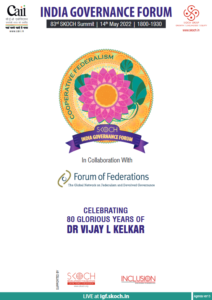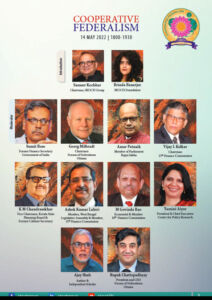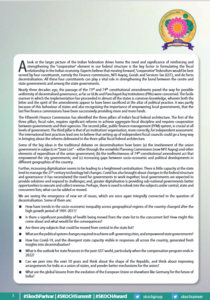
- This event has passed.
India Governance Forum: Cooperative Federalism
14 May 2022 @ 8:30 am - 10:00 am
A look at the larger picture of the Indian federation drives home the need and significance of reinforcing and
strengthening the “cooperative” element in our federal structure is the key factor in formulating the fiscal
relationship in the Indian economy. Experts believe that moving forward, “cooperative” federalism would be best
served by four constituents, namely the Finance commission, NITI Aayog, Goods and Services Tax (GST), and de facto
decentralization. All these four constituents can play a vital role in strengthening the bond between the centre and
state governments and among the state governments.
Nearly three decades ago, the passage of the 73 rd and 74 th constitutional amendments paved the way for possible
uniformity of decentralised governance, as far as ULBs and Panchayati Raj Institutions (PRIs) were concerned. The facile
manner in which the implementation has proceeded in almost all the states is common knowledge, wherein both the
letter and the spirit of the amendments appear to have been sacrificed at the altar of political practice. It was partly
because of this behaviour of states and also the recognition of the importance of empowering local governments, that the
last five finance commissions have been successively providing more and more funds.
The Fifteenth Finance Commission has identified the three pillars of India’s fiscal federal architecture. The first of the
three pillars, fiscal rules, requires significant reforms to achieve aggregate fiscal discipline and requires cooperation
between governments and their agencies. The second pillar, the public finance management (PFM) system, is crucial at all
levels of government. The third pillar is that of an institution/organization, more correctly, for independent assessment.
The international best practices lead one to believe that setting up of independent fiscal councils could go a long way
in bringing about the reforms delineated in the three-pillar fiscal federal architecture.
Some of the big ideas in the traditional debates on decentralisation have been: (a) the involvement of the union
government in subjects in “State List”– either through the erstwhile Planning Commission (now NITI Aayog) and other
elements of expenditure of the union government; (b) the ineffectiveness of 74 th constitutional amendment act that
empowered the city governments, and (c) increasing gaps between socio-economic and political developments in
different geographies of the country.
Further, increasing digitalisation seems to be leading to a heightened centralisation. There is little capacity at the state
level to manage the 21st century technology led changes. Covid has also brought about changes in the federal structure
and governance: it has necessitated the need for governments to work together; local governments are expected to
provide solutions and respond to challenges; and, greater digitalisation is providing sub-national governments better
opportunities to execute and collect revenue. Perhaps, there is need to relook into the subjects under central, state and
concurrent lists; what can be added or moved.
For More Information: https://igf.skoch.in/event_list/cooperative-federalism/
Details
- Date:
- 14 May 2022
- Time:
-
8:30 am - 10:00 am
- Website:
- Register here: https://igf.skoch.in/event_list/cooperative-federalism/
Venue
- Zoom / Youtube
- View Venue Website




